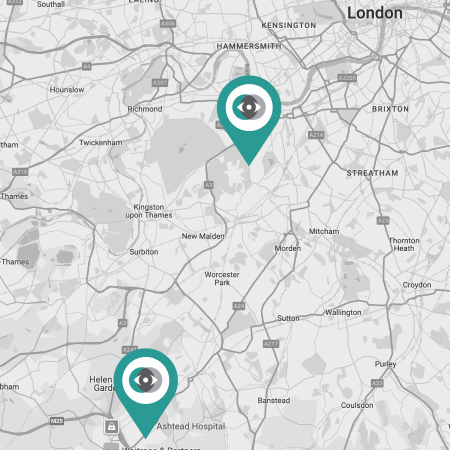
Can cataracts worsen quickly?
If you’ve been told you have cataracts, it’s natural to wonder how fast they’ll get worse. Some people notice changes over years, while others feel like their sight has declined almost overnight. So, can cataracts worsen quickly, and what should you do if they do?
Let’s take a closer look at how cataracts develop, what can make them progress faster, and when it might be time to see an eye specialist like Professor Paul Ursell, a leading cataract surgeon in Surrey, England.
What are cataracts?
A cataract is when the clear lens inside your eye becomes cloudy. The lens focuses light onto the retina, allowing you to see sharp images. When it turns cloudy, your vision becomes blurry, hazy, or dull.
Cataracts are very common and usually happen as a part of ageing. They can affect one or both eyes and often start so slowly that you may not even notice a difference at first.
Common signs include:
- Blurred or misty vision
- Lights appearing too bright or causing glare
- Faded or yellowed colours
- Needing brighter light to read
- Difficulty driving at night
- Increasing changes in glasses
Over time, these symptoms can become worse, affecting your daily life.
How fast do cataracts normally worsen?
For most people, cataracts develop slowly over several years. The cloudiness in the lens gradually increases, and your vision becomes blurrier over time.
However, not all cataracts progress at the same rate. Some may stay mild for years before causing major problems, while others can change noticeably within months.
The speed of progression depends on several factors, including your age, health, and lifestyle.
What can make cataracts worsen faster?
While ageing is the main cause, there are a few things that can make cataracts develop or worsen more quickly. Here are some common reasons:
- Diabetes
People with diabetes are more likely to develop cataracts earlier and see them progress faster. High blood sugar levels can affect the lens, causing it to become cloudy more quickly. - Sunlight exposure
Too much ultraviolet (UV) light can damage the proteins in your lens. Over time, this speeds up cataract formation. Wearing sunglasses that block UV rays can help protect your eyes. - Smoking
Smoking increases the risk of cataracts and can make them worsen faster. The chemicals in cigarettes can harm the lens and reduce the amount of oxygen your eyes receive. - Certain medications
Long-term use of steroid medications, whether in tablet, cream, or inhaler form, can make cataracts form more quickly. - Eye injuries or surgery
If you’ve had a serious eye injury or past eye surgery, the lens may become cloudy sooner. - Genetics
Sometimes cataracts run in families, which can affect how early they appear and how fast they worsen. - Other health conditions
Conditions like high blood pressure or obesity may also increase the risk of faster cataract growth.
What if your cataracts seem to worsen quickly?
If you’ve noticed a sudden change in your vision, like things becoming cloudy, colours looking faded, or lights feeling too bright, it’s a good idea to get checked.
Sometimes, cataracts can appear to worsen quickly because the changes in vision become more noticeable once they reach a certain stage. For example, you might feel fine for a long time, then suddenly find it hard to read or drive at night.
In rare cases, cataracts can worsen faster due to other eye conditions, such as diabetes-related changes or inflammation in the eye. That’s why it’s important to have regular eye exams, especially as you get older.
An experienced eye specialist like Professor Paul Ursell can assess how advanced your cataracts are and advise whether treatment is needed.
Can cataracts suddenly cause serious vision loss?
It’s rare for cataracts to cause sudden blindness, but if they become very advanced, they can make your vision extremely cloudy. This can impact your ability to drive, work, or enjoy everyday activities.
In severe cases, cataracts can also make it harder for your eye doctor to check for other eye problems, like glaucoma or macular degeneration. That’s one reason why many people choose to have cataract surgery before their vision becomes too poor.
When is the right time for cataract surgery?
There’s no exact time when cataract surgery must be done. The right time depends on how much the cataract is affecting your life.
You might consider surgery if:
- You struggle to read, drive, or see faces clearly
- You have trouble with glare from lights, especially at night
- Your glasses no longer improve your vision
- Everyday tasks are becoming difficult
If these symptoms sound familiar, it’s worth having your eyes checked by Professor Paul Ursell. He can assess your vision and discuss whether surgery would help.
What happens during cataract surgery?
Cataract surgery is one of the most common and successful procedures in the UK.
During surgery, Professor Paul Ursell removes the cloudy lens and replaces it with a clear artificial one called an intraocular lens (IOL). The operation usually takes less than 30 minutes, and most people go home the same day.
After surgery, you’ll notice your vision becoming brighter and clearer as your eye heals. Many people are amazed at how vivid colours look again.
Can cataract surgery stop cataracts from coming back?
Yes, once the cloudy lens is replaced, that same cataract cannot come back. However, some people may develop a slight cloudiness behind the new lens months or years later. This is called posterior capsule opacification (PCO) and is easily treated with a quick, painless laser procedure.
Can I slow down cataract growth?
You can’t completely prevent cataracts, but you can take steps to keep your eyes healthy and slow their progression:
- Wear UV-protective sunglasses outdoors.
- Quit smoking if you smoke.
- Manage health conditions like diabetes and high blood pressure.
- Eat a healthy diet rich in fruits and vegetables.
- Have regular eye exams, especially after age 60.
These simple steps help protect your vision and allow early detection of any changes.
Final thoughts
Cataracts usually worsen slowly, but in some cases, they can seem to progress quickly, especially when they start affecting your daily life. The key is not to wait until your vision becomes severely limited.
With expert care from Professor Paul Ursell in Surrey, cataracts can be safely and effectively treated, restoring your clear, bright vision.
If you’re concerned about changes in your sight, take the suitability self-test and find out if cataract surgery could help you see clearly again.
Are you suitable for vision correction surgery?
It isn’t suitable for everyone.
The first step is to book an assessment so you can find out whether you can benefit.
Our most popular procedures
What our patients say…
★ ★ ★ ★ ★“Excellent result. Complete confidence in Paul Ursell. Quiet, quick, and efficient. Peaceful and comfortable hospital.”
★ ★ ★ ★ ★
“The cataract surgery on both of my eyes went very smoothly without any problems. There was no pain afterwards and I didn’t have to wear any eyepatch. I would highly recommend Professor Ursell for cataract surgery.”
★ ★ ★ ★ ★“Highly professional, extremely efficient, and an excellent communicator, Paul exudes experience, knowledge, and ability. The whole process — initial consultation, operation, and post-op check-up — was wonderfully stress-free. I now have 20/20 vision, am glasses-free, and I am delighted by the results.”
★ ★ ★ ★ ★
“The cataract surgery has completely changed my life. Mr. Ursell put me at ease and explained all options. The procedure was quick and painless and completely successful, and I now have 20/20 vision in my good eye. One of the reasons I had the surgery was because of Mr. Ursell’s standing and experience. Cannot praise highly enough.”
★ ★ ★ ★ ★
“I was very short-sighted and my cataracts badly affected both reading and distance acuity. After the operation I now have very good distance vision (glasses-free) but still need glasses for reading. (This was the expected outcome as I did not want multi-focus implants). The operation was quick and painless, and I had no post-operative discomfort at all (which surprised me). The results are remarkable.
I can certainly recommend Professor Ursell. He is a personable consultant and a skilled surgeon.”
★ ★ ★ ★ ★
“Dr. Paul Ursell squashed many of my concerns for not having cataract surgery. He offered comfort with examples of his long/distinguished career and new technology that he applies to the surgery.
Both before and after the surgery, Dr. Ursell and staff gave me the information and attention I needed. It was a great success, and I highly recommend Dr. Ursell.”
We have replaced the images of real patients who provided these testimonials to protect their privacy.








